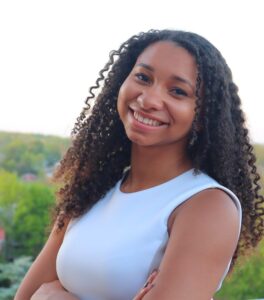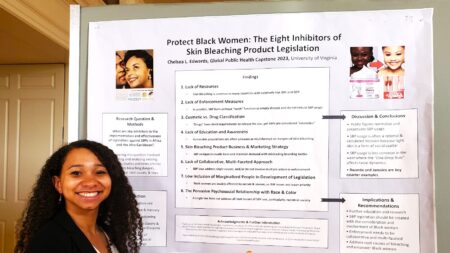
Chelsea Edwards, 2023 Graduate in Global Public Health and Spanish
A May 2023 graduate in Global Public Health and Spanish, Chelsea Edwards completed her GPH research project entitled, “Protect Black Women: The Inhibitors of Skin Bleaching Product Regulation and Intervention in the African Diaspora”. Skin bleaching is the use of topical creams/lotions/gels, etc., used with the intent to lighten the complexion of the face and body. A practice common in Latin America, East/South Asia, Africa, and the Caribbean (essentially anywhere colonized by Europe), Chelsea focused her capstone on African and Afro-Caribbean women.
Describing the history, Chelsea wrote, “The practice of skin bleaching is derived from racism/colorism that emerged during slavery and colonization, which created a social hierarchy that placed Black people on the bottom and labeled their features as ugly and undesirable.” Then, she related the current situation, “Today, light skin functions as social capital in society, as fair skin people are found more likely to be employed, have higher education, have higher social status, have a social support network and/or spouse, and higher personal earnings. Many people bleach their skin today as a survival method to access higher social status, and particularly for women, whose social acceptance and valuation is tied to their attractiveness due to patriarchal systems; bleaching is also linked to beautification. But obviously, dark skin is not inferior to light skin.”
As far as health effects, Chelsea found that skin bleaching has no health benefit and skin bleaching products are linked to significant dangers. Risks can include cancers, scarring, mercury poisoning and other illnesses due to inclusion of hydroquinone and mercury as active ingredients. Chelsea pointed out, “Racism and colorism are also linked to mental health and esteem issues for minorities devalued by society. Many people who use SBPs today do not bleach out of self-hatred, but rather, as a calculated survival tactic to access higher social status. Black women are not simply insecure, vain, or secretly wish to be white, but have been forced by colonization to alter themselves to survive.”
“With all these things in mind, I find it to be egregious that more is not being done to curb access and usage of skin bleaching products (SBPs),” exclaimed Chelsea. “Thus, my project served to answer the question, ‘why have countries failed to protect Black women?’ Or in other words: ‘What are the inhibitors to the creation of regulations/interventions aimed at limiting SBP usage, and why are most existing legislations ineffective?’”
Chelsea’s capstone findings produced eight non-mutually exclusive inhibitors to the implementation and effectiveness of skin bleaching product regulation. “I identified Rwanda as a particular counter example that is an inspiring success story on regulating SBP sale, distribution, and usage. In my discussion, I explored skin bleaching among Black women in Europe and the United States as a cross cutting theme and explore the potential impact of the One-Drop Rule and Black pride movements as they relate to SBPs.”
Chelsea remarked, “I am very proud of this project, as skin bleaching product use is so under-researched.” Her recommendations include further education on the dangers of bleaching, simultaneous top-down and bottom-up intervention, inclusion of the affected community (Black women) in the legislative process, and ultimately, anti-discriminatory efforts to uplift dark skin Black women, such that they have the same opportunities as fairer skinned people, and no longer need to bleach their skin as a survival tactic.
Having studied previously at the University of Oxford and in Valencia, Spain, Chelsea is abroad again and currently living in Barcelona, Spain where she will teach English for a year after gaining CertTESOL Certification. Later in 2024, Chelsea will return to the US to work full-time as an Associate Consultant at Bain & Company in New York City where she worked as an intern in 2022. Her future goals may also include law school with a focus on health law. Outside of work and education, Chelsea enjoys volunteering for youth leadership programs and all types of Latin dance.
Congratulations on your achievements, Chelsea! We know you will do great things!

Chelsea Edwards presents her capstone research project on skin bleaching.
